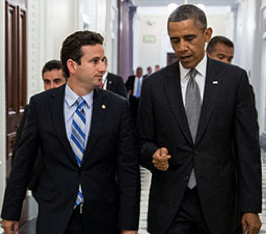While change sweeps country, Hawaii remains the same

U.S. Senator Brian Schatz, D-HI, endorsed by President Obama in the Democratic primary
By Malia Zimmerman | Watchdog.org
HONOLULU — While voters across the country handed Republicans control of the U.S. Senate and expanded their numbers in the U.S. House of Representatives, virtually nothing changed for Hawaii.
Hawaii’s Democratic Party still has a stronghold on state and federal politics, putting Hawaii in the solidly “blue” category.
U.S. Sen. Brian Schatz, D-Hawaii, backed by President Barack Obama, easily won re-election, beating out Republican challenger Cam Cavasso.
U.S. Rep. Tulsi Gabbard, D-Hawaii, also won re-election by a large margin, despite putting her campaign on hold while on deployment with the Hawaii Army National Guard on Hawaii Island.
Former Republican U.S. Rep. Charles Djou was unable to beat State Rep. Mark Takai in the 1st Congressional District race, despite political polls showing their race was extremely close. Djou lost by about 4 percent. Takai, like Schatz, was endorsed by Obama.
State Senate Ways and Means Chair David Ige, D-Aiea, handily beat former Lt. Gov. Duke Aiona, a Republican, in the governor’s race.
Ige earlier ousted incumbent Gov. Neil Abercrombie in what was described as largest primary loss of any sitting governor in U.S. history. Ige primarily ran a grassroots campaign, relying not on his debating skills but rather his personal story that he shared with much smaller groups during coffee hours, breakfasts and stew dinners.
Former Mayor Mufi Hannemann, a Democrat who ran as an independent candidate for governor, only garnered 11 percent of the vote, just 9 percent more than Libertarian Candidate Jeff Davis.
Hannemann is the former Honolulu mayor, and had previously been defeated in gubernatorial and congressional races.
Political analyst Neil Milner called Hannemann “a tragic candidate.”
In the state House, virtually all incumbents except for Rep. Karen Awana, D-43, kept their seat.
Awana received a wave of bad publicity in October 2013, after Hawaii Campaign Spending Commissioners sanctioned her campaign, issuing the maximum fine of $8,590 for 54 violations of the state’s campaign spending law.
Awana resigned two days later as Democrat House Majority Leader after the commission staff notified her she’d likely face steep fines for nine counts of filing false or inaccurate reports, 24 counts for untimely campaign donation deposits and failure to keep records.
In 2012, the Commission fined Awana twice in the amounts of $6,800 and $400 for the exactly the same types of violations.
Republican Andria Tupola won the seat with 56 percent of the vote to Awana’s 42 percent.
House Speaker Emeritus Calvin Say retained his seat despite negative publicity from a legal challenge to his candidacy, which stemmed from accusations that he doesn’t live in his district as required by law.
State Rep. Richard Fale, a Republican who ran for the open Senate seat in Kahaluu and the North Shore left vacant when Sen. Clayton Hee ran on the Democratic ticket for lieutenant governor, was unable to beat former Rep. Gil Riviere.
Riviere was a Republican while he was in the state House, who ran for the Senate seat this election as a Democrat. Fale beat Riviere in a previous House race.
Republicans will hold eight seats of 51 in the House. The minority party picked up one seat. Feki Pouha, a Republican, beat Kent Fonoimoan, a Democrat, in the fight for the seat left open by Fale.
Senate Minority Leader Sam Slom, who was not up for re-election, will remain the only Republican in the 25-member body.
Hawaii had the worst voter turn out ever in the state’s history at 48 percent.







